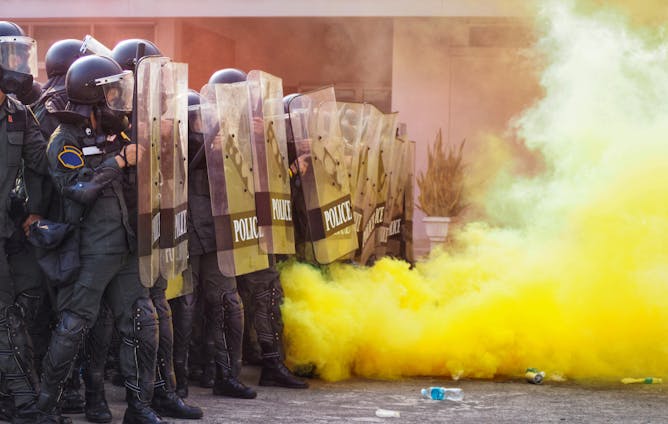|
|
|
Editor's note
|
|
Riots seemingly can erupt anywhere, and at any time, bringing chaos to otherwise peaceful towns and cities. But what role does psychology play in these eruptions of violent unrest – and can it explain how crowds behave?
Traditionally, riots were considered to be the consequence of an irrational “group mind”, leading individuals to lose their sense of self and reason and behave in ways they never would if alone. Contemporary research, however, has shown this to be misleading.
In fact, while individuals in a riot may act in a criminal way, their behaviour is rarely mindless. Instead, they are governed by a set of “rules” motivated by a strong sense of social identity. And by accepting this, we can better understand what drives crowds to violence.
Meanwhile, the situation in Hong Kong is becoming ever more serious, escalating into full-scale street battles. We examine how police legitimacy is draining away in this spiral of rage and retaliation.
|
Matt Warren
Deputy Editor
|

|
|
Top stories
|

Fanning flames.
Shutterstock
Matthew Radburn, Keele University; Clifford Stott, Keele University
According to research, a strong sense of social identity and empowerment often dictates how rioters behave.
|

Police fire tear gas to deter protesters in Hong Kong.
Jerome Favre/EPA
Carol Anne Goodwin Jones, University of Birmingham
Two deaths and video of a police man shooting a protester have hardened attitudes of Hong Kongers against the police.
|

Lenscap Photography via Shutterstock
David Deacon, Loughborough University; Dominic Wring, Loughborough University
Analysis of the first week of the campaign shows that not all publicity is good publicity.
|
Arts + Culture
|
-
Griff Round, Keele University
As the British retail landscape shifts and sales fall, how much longer will Christmas ads be a fixture of the season?
-
Paul Basu, SOAS, University of London
Art, outreach and fieldwork can help reframe Britain's imperial past, by re-humanising the people subjected to anthropological 'colonial science'.
-
Jack Denham, York St John University; Matthew Spokes, York St John University; Steven Hirschler, York St John University
It's a worn-out debate based on no strong evidence, and if violent themes are going to be picked apart, then the real-world violence they're mimicking must be too.
-
Erica Wickerson, University of Cambridge
Killing Eve may seem like an ultra-modern take on the spy genre but it is more traditional that it seems.
|
|
Politics + Society
|
-
Benjamin Sachs, University of St Andrews
Deeply divisive issues like Brexit are seeping into the way people interact with one another, undermining trust and tolerance of others.
-
Tim Bale, Queen Mary University of London
The Brexit Party's most baffling decision is to continue to fight key Labour-held seats. But all is not what it seems.
-
Elise Lobbedez, EM Lyon
Including direct accounts from 'yellow vests' members in the Lyon area, a look back at what has changed in the daily lives of people in the movement.
|
|
Environment + Energy
|
-
Paul O'Hare, Manchester Metropolitan University; Iain White, University of Waikato
Current policy to manage and protect people from flooding disadvantages those who are most vulnerable.
-
Matthew Eisler, University of Strathclyde
Bolivia's huge lithium reserves are isolated and hard to extract, and global uncertainty over electric vehicles is bad for business.
|
|
|
|
|
|
| |
| |
| |
| |

|
| |
| |
| |
Featured events
|

|
Julian Study Centre Lecture Theatre, University of East Anglia, Norwich, Norfolk, NR4 7TJ, United Kingdom of Great Britain and Northern Ireland — University of East Anglia
|

|
G10, Palmer Building, Whiteknights Campus, University of Reading, Reading, West Berkshire, RG6 6UR, United Kingdom of Great Britain and Northern Ireland — University of Reading
|

|
Oxford Martin School, 34 Broad Street, Oxford, Oxfordshire, OX1 3BD, United Kingdom of Great Britain and Northern Ireland — University of Oxford
|

|
Lecture Theatre One, UEA, Norwich, Norfolk, NR4 7TJ, United Kingdom of Great Britain and Northern Ireland — University of East Anglia
|
|
|
|
| |
| |
| |
| |
| |
|
|
|
|
|
|
|